#bastille 1793
Explore tagged Tumblr posts
Text
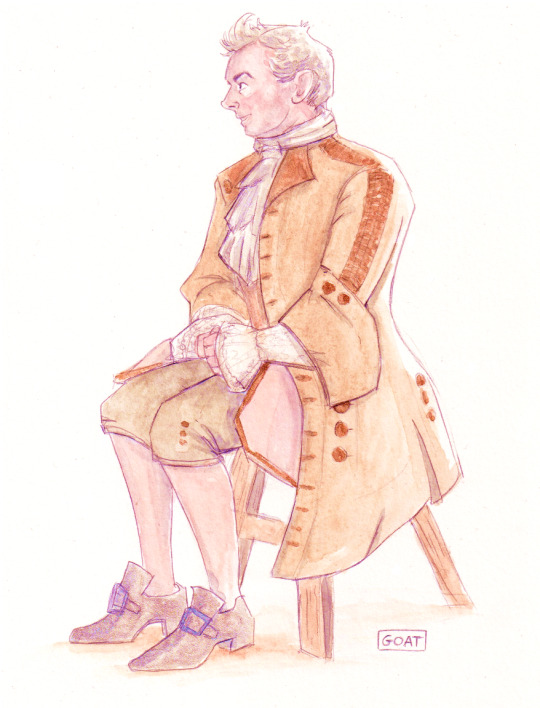
"oh, good lord"
#my art#good omens#aziraphale#good omens fanart#good omens art#ineffable husbands#good omens 1793#bastille aziraphale#gomens art#go fanart
343 notes
·
View notes
Text
read full work here
Aziraphale rubbed his wrists, and Crowley’s ophidian eyes were on the action like a ravenous wolf ready to strike. He was glad for his sunglasses now, how they hid the dilation of slit pupils at the sight of angelic skin.
“I suppose I should say thank you. For the, uh, rescue.”
Aziraphale must know what it did to him, when those eyes looked him up and down, when they lidded with just the right amount of playfulness, when those soft pink lips parted like an invitation.
“Don’t say that,” a thank you would get him into hot water with Downstairs indeed, and being caught in such a slip-up meant less unsupervised visits to Earth, and that meant more time away from the magnetising call of the being ahead. “If my people hear I rescued an angel I’ll be the one in trouble, and my lot do not send rude notes–”
“Well, anyway, I’m very grateful. What about if I buy you lunch?”
As if there was a chance in Hell, Heaven or Earth Crowley could ever say no.
“Looking like that?”
Amber irises scanned the vision of the now standing Aziraphale, taking in the absurdity of his attire, the adorable naiveté that permeated every single fibre of clothing that touched his form, the way the curve of soft belly was still visible under the layers.
Aziraphale sighed, glancing over at the frozen Jean-Claude behind him.

#good omens#good omens fandom#crowley#aziraphale#aziracrow#crowley x aziraphale#aziraphale x crowley#good omens 1#good omens season 1#good omens fanfic#gomens#ineffable#ineffable husbands#ineffable lovers#ineffable idiots#anthony j crowley#1793#good omens 1793#good omens bastille#bastille#the beauty of being an ao3 writer#ao3 fanfic#ao3 writer#ao3#ao3 link#ao3fic#ao3 author#fanfic
24 notes
·
View notes
Text
"This is humiliating Aziraphale."
"I rather think that's the point, dear."
*malfunctioning demon noises*
*happy angel noises*

Companion piece to this one.
I couldn't stop thinking about Crowley in the satin shoes.
#Bastille on the brain#his blindfold is Aziraphale's little ruffly neck tie#good omens#good omens fanart#aziracrow#crowley#good omens art#good omens 1793
64 notes
·
View notes
Text
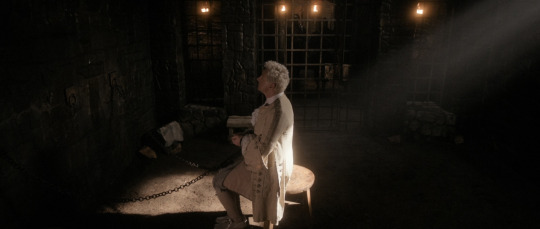
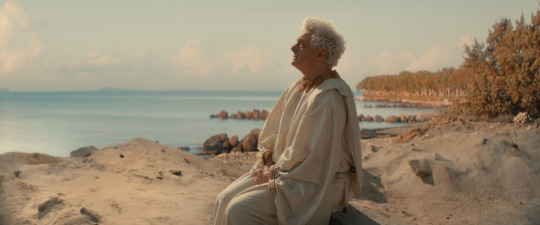
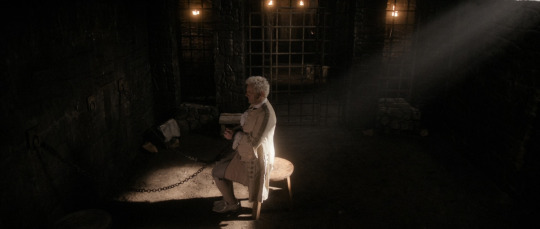

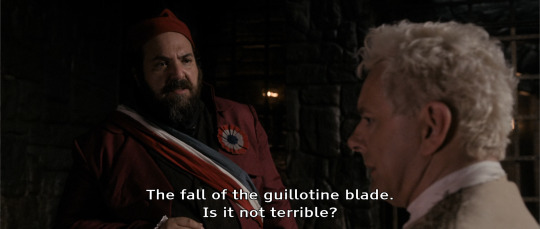

#good omens#good omens 2#aziraphale#good omens parallels#good omens analysis#good omens clues#job minisode#a companion to owls#aziraphale my beloved#good omens 1793#uziraphale#bastille#land of uz
39 notes
·
View notes
Text
Their faces when they bring up the Bastille incident. 😩😩😩
"Paris. 1793."
"Yes, the Reign of Terror."
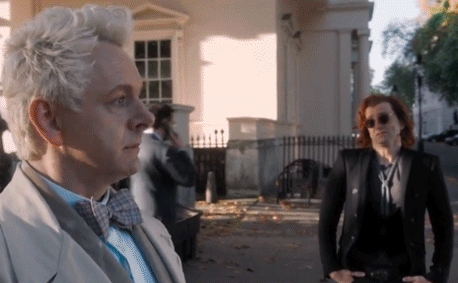
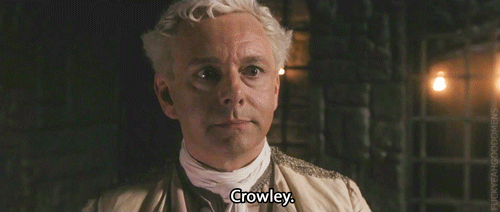
#good omens#crowley#aziraphale#ineffable husbands#aziracrow#aziraphale x crowley#good omens 1793#good omens crepes#good omens paris#good omens the bastille
40 notes
·
View notes
Text

Could it be, a cute Bastille angel wip? Why yes, it is!
#good omens#aziraphale#bastille#good omens 1793#1793 aziraphale#wip#good omens fanart#geth draws#geth wips
12 notes
·
View notes
Text
https://www.instagram.com/p/DAo2aCSSLTc/?igsh=MTJvYzk2ZHJsNW5heA==
Omggggggg yes.
#good omens#aziraphale#bastille princess#1793#good omens 1793#bastille#take the hint crowley for go-for sa-FOR SOMEBODY'S SAKE
3 notes
·
View notes
Text
On this July 14th, let's never forget that Pierre-François Palloy was a fat capitalist.
#frev#Started demolishing the Bastille without the assembly's approval#Wasn't convicted because wealthy and stable business#embezzled the funds donated for the destruction#Sold the stones and chains turned into souvenirs#Built two residences with the remaining Bastille materials#Imprisoned from December 28#1793 to March 17#1794 but not quillotined#booooo !!!!!#died ruined#bitter sweet ending
10 notes
·
View notes
Text
The Final 15 - Aziraphale’s Perspective
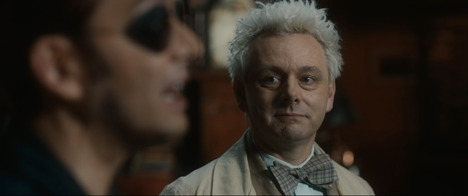
I see a lot of empathy for Crowley’s experience during the final 15 minutes of season 2 and it makes sense that we feel deeply for him. What he is experiencing is very human - acknowledging the depth of his own feelings, plucking up the courage to say something, having it come out all wrong, feeling utterly rejected, and then walking away in a mix of pain and anger. Who among us hasn’t been there?
But Aziraphale is experiencing something more complicated, something fewer of us have analogs for. Aziraphale has internally acknowledged his feelings for Crowley for some period of time, probably at least since 1941. Michael Sheen confirms this mental state in a NYCC 2018 interview:
“I decided early on that Aziraphale just loves Crowley. And that’s difficult for him because they are on opposite sides and he doesn’t agree with him on stuff. But it does really help as an actor to go, ‘My objective in this scene is to not show you how much I love you and just gaze longingly at you.’”
Unlike Crowley, Aziraphale’s struggle isn’t acknowledging his feelings. His struggle appears to be two-fold: 1) believing that Crowley could ever love him back and 2) even if Crowley did love him, believing a future for the two of them together could exist within the restrictions of his larger world view.
Can Crowley love?
Angels are, traditionally, beings of love. We see Aziraphale embody this time and again, showing kindness and support to almost everyone he meets, including the amnesiac Gabriel who has treated him abominably in the past. He is attuned to love, remarking on how the area around Tadfield “feels loved” twice in Season 1. As for how Aziraphale personally understands and expresses love, he shows his love to others through verbal affirmation and, to a lesser extent, physical touch. There are many examples of Aziraphale expressing his love for Crowley through positive verbal affirmation, typically by praising him for instances where he has been kind, nice, or good. And on the rare occasions when Aziraphale receives verbal praise, he absolutely interprets it as an expression of love, blossoming with happiness.
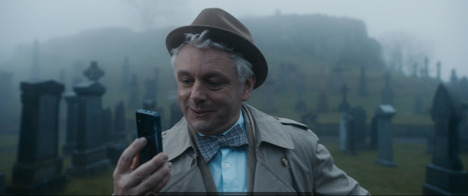
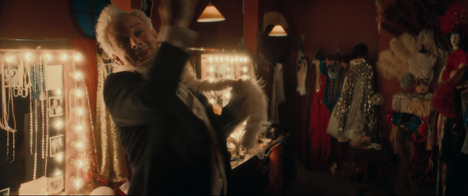
But from Aziraphale’s perspective, it may be unclear if Crowley can feel love in the same way. Can demons love? Did he lose that capability when he fell? Crowley can’t feel the aura of love in Tadfield that Aziraphale remarks on, and his reactions to Aziraphale’s praise are always to shrug it off, tell Aziraphale to “shut up,” or in the most extreme case to physically slam him against a wall and get in his face about it. In this last instance he tells Aziraphale, “I’m a demon, I’m not nice. I'm never nice. Nice is a four-letter word.” A four-letter word, like love, that is not in Crowley’s self-defined vocabulary.
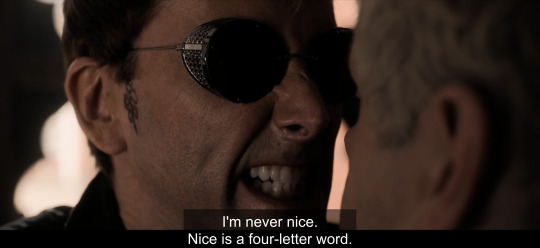
If Crowley can feel love, does he love Aziraphale?
Even if Aziraphale believes Crowley is capable of feeling love, he does not always recognize how Crowley expresses it in the moment. Crowley shows his love for Aziraphale through actions, but Aziraphale often misconstrues Crowley’s motivations. In 1793 when Crowley rescues him from the Bastille, Aziraphale initially assumes Crowley is only there because he is responsible for the Reign of Terror. Similarly, in 1941, Aziraphale’s reaction to Crowley’s appearance is to assume he’s just part of the Nazi gang, saying,“I should have known. Of course. These people are working for you!”
Crowley doesn’t help matters in this regard because he is constantly muting and undercutting his signals to Aziraphale. Every time Crowley expresses his love for Aziraphale through actions - rescuing him, saving his books, even taking him to lunch - he does so in a nonchalant, dismissive manner, indicating he ascribes little value or importance to the actions he has performed. “I just didn’t want to see you embarrassed,” he says when he appears in 1941. And when Aziraphale positively glows with happiness about his books being saved, Crowley tells him to “shut up."On top of these confusing signals, Crowley is almost pathologically incapable of expressing his feelings in the verbal love language that Aziraphale can understand. This is heartbreakingly demonstrated in this scene after the bookshop fire:

Crowley can’t even say “I lost you.” Instead he speaks of Aziraphale in the third person while sitting in front of him, saying, “I lost my best friend.” The little hitch on Aziraphale’s face when he hears this is just devastating. Who is Crowley talking about? The last conversation they had before this scene was when Aziraphale called while Hastur was in Crowley’s apartment and Crowley said, “Not a good time - got an old friend here.” Aziraphale is left to wonder - is that who Crowley means when he says "best friend?" Crowley is everything to Aziraphale, but what is he to Crowley?
How Would It Even Work?
Even when Aziraphale does get flashes of the possibility that Crowley may care for him he immediately runs up against his second mental block - there is no world he can imagine where they could be together. When Crowley first suggests running off together in the bandstand scene in S1E3, Aziraphale collapses under the thought: “Friends? We aren’t friends. We are an angel and a demon. We have nothing whatsoever in common. I don’t even like you.”
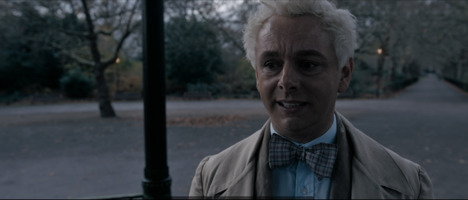
While he is obviously in denial, Aziraphale is also under tremendous stress in this moment and is desperately trying to hold onto some stability by falling back onto his world view and ideology. In this state he backpedals all the way to “I don’t even like you.” In his understanding of the way the universe is supposed to work, he and Crowley are hereditary enemies and should not even be friends, much less in love. Aziraphale expresses this core belief throughout the series. What kind of existence could they ever have together in reality?
The Final 15
With this as a background, we can better understand what Aziraphale experiences in the final 15 minutes. Even before the Metatron enters the scene, Aziraphale begins to have his fundamental beliefs challenged which puts him off his footing. The revelation that Gabriel and Beelzebub are in love is deeply impactful. When Beelzebub says “I just found something that mattered more to me than choosing sides” and takes Gabriel’s hand, Aziraphale immediately reaches out to make contact with Crowley, a look of incredulity on his face. Here is proof that demons can feel love and that an angel and a demon can carve out a space together. The road may be difficult, but it is not impossible.
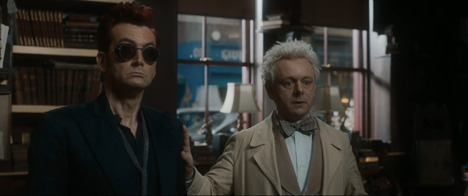
Before Aziraphale can digest this revelation the stakes are ratcheted up: Michael threatens to erase Aziraphale from the Book of Life due to his part in hiding Gabriel. The future that Aziraphale has just barely glimpsed is already under siege. It is at this point that The Metatron enters, offering Aziraphale not just survival and protection, but a version of everything he has ever wanted.
If Crowley is reinstated as an angel, Aziraphale will no longer have to wonder whether Crowley is capable of feeling love. And if they are both angels, there will be no conflict inherent in having a life together. In one fell swoop, the Metatron entices Aziraphale with a future where there are no remaining blockers to an eternal, loving existence with Crowley. It will be “like the old times, only even nicer” because they now have millennia of their shared history to build on together. Of course this logic is horribly flawed and does not take into account at all what Crowley wants, but in the moment it must feel like an enormous gift to Aziraphale.
Unfortunately, not only is Crowley’s reaction to this “incredibly good news” not what Aziraphale expects, the conversation quickly takes a baffling turn for him. Crowley shuts down the talk about returning to heaven and attempts to say what he wants to say. Sadly he once again utterly fails to speak in a way that Aziraphale can understand.
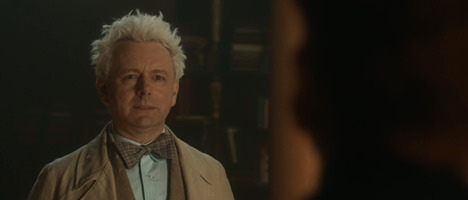
The audience knows what Crowley is trying to say because we have the context of his earlier conversation with Maggie and Nina. But Aziraphale lacks that and thus can’t understand where this is coming from or what it means. Rather than expressing his feelings as Beelzebub and Gabriel did, Crowley recites facts: we’ve known each other a long time, we’ve been on this planet a long time, I could always rely on you, you could always rely on me. He can’t even say the word “couple” when he describes them, referring to them more as colleagues with words like “team” and “group.” And the one time he does try to express his feelings and desires he is physically unable to get out the words: “And I would like to spend—.” He then retreats into his old plea to turn away from heaven and hell and run off together. Nowhere in Crowley’s confession does Aziraphale hear “I love you” or even “I want to be with you.” What he hears instead is what he’s heard multiple times before - Crowley wants to abandon both heaven and hell and default to just the two of them. From Aziraphale’s perspective this will not solve anything for them. They will still be an angel and a demon, at some level fundamentally separated by their very natures.
Having failed in his speech, Crowley then does two things in rapid succession that must be excruciatingly painful for Aziraphale. First, he does the opposite of verbal affirmation by calling Aziraphale an idiot. We have seen Aziraphale become physically radiant in the rare instances where Crowley has praised him, so a direct insult like this must feel poisonous. Then Crowley makes a last desperate attempt to communicate through Aziraphale’s other love language - physical touch - by initiating the kiss. But without context or understanding of what is behind it, Aziraphale can initially only experience it as forceful, angry, and shocking. With more time to parse it I think Aziraphale will come to understand Crowley’s meaning, but in the moment it must feel manipulative and borderline cruel.
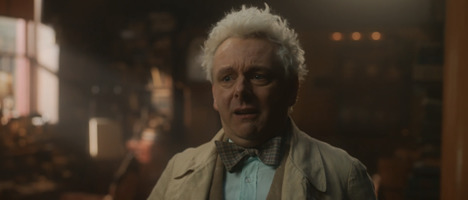
The Results
In a very compressed time frame, Aziraphale has to move quickly and radically through multiple mental and emotional states. For 6000 years he has believed he and Crowley cannot be together. Suddenly, with the revelation of Gabriel and Beezlebub, that foundational belief is challenged. Before he can work through what that could mean for him and Crowley, the Metatron offers an even cleaner solution - they can be protected from retribution and be on the same side again. When Crowley rejects reinstatement wholesale, it makes Aziraphale feel that he and his loving offer of a life together have been personally rejected. Then that rejection is further confused through the shocking experience of the kiss which Aziraphale does not have adequate context for or time to understand and integrate. In his emotional turmoil, Aziraphale falls back on his default crutch for dealing with sadness and anger - forgiveness - which further cuts him off from Crowley. Taken all together, this is a tumultuous rollercoaster of whiplash emotions that pull at every part of Aziraphale's self- and world-views.
Compared to what Crowley is going through, I think Aziraphale is going to have the tougher road in Season 3. Crowley may still need to better reconcile and integrate his feelings for Aziraphale, but Aziraphale has 6000 years of foundational ideology to challenge and evolve to reach a place where he and Crowley can be together as their authentic selves.
#good omens#aziraphale#crowley#aziracrow#ineffable husbands#good omens meta#good omens 2#gomens#essay#final 15#crowly x aziraphale#good omens s2#good omens season 2
1K notes
·
View notes
Text
That night in 1941... is the night that Crowley (temporarily) died?
What is the dramatic thing that happens to Crowley on that night in 1941 that causes Aziraphale to still feel guilt and regret over it into the present?

Could it be that one of the reasons why 1941 is so significant to them is because it was as Furfur foreshadowed in Part 2-- their last night on Earth-- because it was, for a time, the last night of Crowley's life?
So, I think we all agree that something very, very major has to happen in the inevitable 1941, Part 3. I don't just mean only the inevitable canoodling. There's something more that these flashbacks are building towards because this is the big flashback that we're watching across all the seasons. It parallels and underlines the story in the present. Crowley and Aziraphale have had over 6,000 years on Earth but it's this night in 1941 that runs through the story so there has to be a big reason for that.
While there's plenty of suggestion that these two are going to bed in Part 3, there's another scene in the present of S2 that indicates that that's not at all what The Big Thing about this night actually is.
It might be a pretty big thing to some of the audience but it's not going to be any sort of romantic first for Crowley and Aziraphale and it's not the only thing that 1941 is building towards. What makes me think this?
The context of the scene in S2 wherein one of them-- Aziraphale-- actually directly mentions 1941 and Aziraphale's tone when he does.


While we have watched two very, very romantic parts of this night of 1941 so far-- and while we know it was that to them, too-- look at how Aziraphale refers to it in the present of S2...
There's a regret to this, a sense that he was the one in the wrong about something in 1941, even if Crowley might not agree with that.
I think that it's suggestive of Part 3 involving something related to Crowley about which Aziraphale is still regretful into the present of S2-- something he feels he was wrong about. This would be something we still haven't seen yet because, so far, Crowley and Aziraphale are winning at 1941. We've just watched two parts of them helping one another and emerging victorious from trouble, right?
We last left them in Part 2 flirting and drinking Chateauneuf-de-Pape... yet, also, we also still have the Zombie Nazis, an embarrassed Furfur, and a Chekhov's gun Derringer still in play ahead of Part 3. It doesn't bode well, then, when Aziraphale mentions the 1941 night aloud in the present of S2 with the tone that he used when he did. So, what might have happened that night in 1941, based on what other times Aziraphale mentioned during that same scene?
While we don't know what happened in 1650 right now and, depending upon what's in The Finale, it might always be speculative, we do know what happened in 1793. We know why Aziraphale would feel the need to apologize and see himself as having made a mistake. It's evident that Aziraphale regrets miscalculating the scenario in The Bastille in such a way that he wound up unintentionally triggering Crowley with Jean-Claude the Executioner.
While he and Crowley were ultimately alright and had a nice, crepes-laden time in Paris to a point that "Paris, 1793" was memorable enough to be shorthand in the 2008 story in the first episode, it's also an example in Aziraphale's mind where he feels he made a mistake in his care of Crowley and so was the one apologizing-- doing a metaphorical apology dance.
So, this might be telling us that something happened to Crowley in 1941... something pretty bad, as Aziraphale's tone when he mentions it indicates that he considers it worse than 1793. Given what we've seen so far, this something bad is part of what's coming in 1941, Part 3 in The Finale. Something big enough that it's really to where our watching of this night during both scenes has been leading.
There are a few, other scenes that I think might be providing us with some Clues as to what that thing is.
One Clue is Furfur saying: "Enjoy your last night on Earth."

At present, we think that Crowley and Aziraphale have evaded this threat because Aziraphale got the evidence photo away from Furfur... but there's still a Part 3.
This would be a big twist because we're not expecting this right now. We last left them drinking wine in the bookshop. Most of our theories (including a couple of my own) have been centered around more romantic aspects of Part 3-- and those could all still well hold up. But while it might be the first time we are shown that more directly, it's not the first time any of it's happened. Anything romantic in a new way wouldn't really explain Aziraphale's regret over this night in the present of S2.
What if the reason why, of all the very romantic nights that Crowley and Aziraphale have had over the years, we're watching this one in 1941 is because this was, for a time, until Aziraphale brought him back, their last night on Earth together because it was the last day of Crowley's life?
Still shuffling out there are The Nazi Zombie Flesheaters and we've got two different guns-- The Bullet Catch and Aziraphale's Chekhov's gun of a Derringer-- in play in the bookshop. Greta can get into the bookshop because Aziraphale let her in when she recruited him. If some kind of conflict happens and a gun goes off, what if Crowley got shot and, worse, died for a little while?
Aziraphale will blame himself for that forever, no matter how much Crowley will tell him not to. To Aziraphale, Crowley will have only been there with him that night and in danger because he showed up in the church to rescue Aziraphale from the Nazis. It would explain how Aziraphale feels about 1941 in the present.
There's also the dramatic irony of them doing The Bullet Catch successfully... only for Crowley to then get shot later that night...

...as well as the way the photograph Furfur took of the two of them on stage would change if it was this one picture of the two of them living life together that ended up being taken just hours before Crowley died.

We also had the stakes raised for us in Part 2 by Furfur explaining that Aziraphale being shot could have real, deadly consequences. It's something that we think right now that we just needed to know to understand the stakes of them doing The Bullet Catch in Part 2 but it might also have been set up to make us understand the severity of the situation if Crowley were to get shot, say, right near the heart, in Part 3.
And speaking of getting shot near the heart... the show has a bunch of other scenes that seem like they might look different in retrospect if we see a 1941, Part 3 wherein Crowley was temporarily killed during a probable confrontation with some, ah... *checks thematic notes* well, with some other dead people who also came back to life on this night in 1941...
There's the foreshadowing of Crowley getting shot in the chest with the paint in Tadfield and the way he instinctively clutches his heart...

...there's Crowley getting shot in the chest in the bookshop with the fire hose's water...

...there's maybe even a tie to it in Aziraphale petting Crowley's chest over his heart in The Dirty Donkey.

So, let's say Crowley does get shot somehow during all of this. Maybe there's a miracle block that Furfur put on the bookshop so the zombies could get inside or something so Aziraphale can't just fix it with a miracle. We could then get this whole, angsty and perfect scene of Aziraphale trying to save Crowley the human way because they're stuck there with no miracles and Crowley's too wounded to move. Crowley dies, Aziraphale's a mess, and somehow eventually brings him back... maybe like how Aziraphale's parallel, Beez, brought back Shax on Crowley's couch in 2.06? Not sure if that's connected but it has the feeling like it might be.

Finally, there's the sex-and-death of it all, which is something I looked at in this meta. If there is ever a time in Good Omens where one of them is going to die, it's so going to be the same night as when we first go into Aziraphale's bedroom, and the end of 1941, Part 2 has dialogue that pretty heavily suggests they're going to be upstairs, ah, retiring the act in Part 3. Having some metaphorical "little death" and then getting some literal death would be the most Good Omens thing to ever Good Omens. 😂

Why do I get the feeling that the above might not be the first time that Aziraphale's said that in the bookshop about a feared dead Crowley?

95 notes
·
View notes
Text
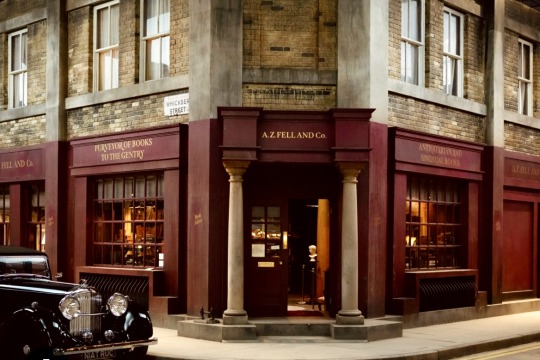
A Mini-Meta Musing (#1)... Anything To Protect Crowley
I'm always a bit surprised at how Aziraphale is underestimated in the fandom. (I know he's in everyone's bad books rn, but breathe deeply and hear me out!). I've seen a lot of debate about how much, in his relationship with Crowley over the years, Aziraphale is rigidly fixated on right/wrong, good/evil, and uses it to push Crowley away. Sometimes, however, these discussions forget to take into account how often Crowley was punished by Hell. And Aziraphale knows.
Once he understood the constant risk of retribution the demon faced, Aziraphale's primary instinct and his self-appointed mission in the relationship became Protect Crowley. No matter what. Protect Crowley even when his friend is careless with his own safety. It's a huge factor in why he so often pushes Crowley away in later years, when they seem to be beyond all that. And I believe that it's also the real reason he built the bookshop.
Aziraphale desperately hopes the bookshop can help keep Crowley safe.
It takes a very long time for Aziraphale to recognize how dangerous their relationship is for Crowley. In the early centuries, the angel is buying the Party Line -- if you made it through the Fall, you're holy and perfect. In Eden, and again in Job's cellar, he misses the demon's ironic humor and is very caught up in holier-than-thou thinking. That doesn't exactly enourage Crowley to confide his secret shame. Our devil-may-care demon desperately wants to look confident and dashing and independent, not fearful and bullied. Eventually, however, whether Crowley confided or Aziraphale guessed, our foolish Principality realizes the danger, and he grows up a lot.
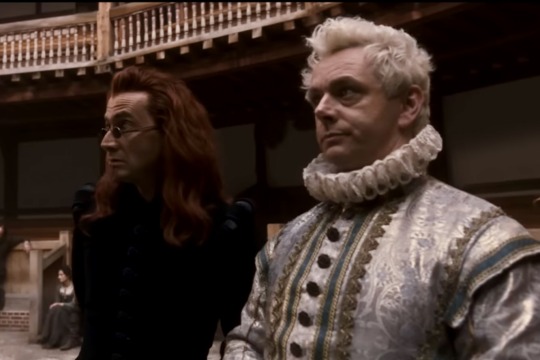
By 1601, at the Globe Theatre, he's more worried about the cruelty of Hell then Crowley is. Aziraphale at first *looks like* he's scorning Crowley's proposal in the arrangement, but he's actually trying, in his own way, to subtly "shush" Crowley's loud and daring carelessness. We know this because he then worriedly reminds the demon that, "if Hell finds out, they won't just be angry, they'll destroy you."
I propose that Crowley did actually get punished for his indiscretion in some way, sometime after that. When he shows up at the Bastille in 1793, sure, he's putting on fashion-model poses to impress the flirtatious angel, but he's also much less relaxed. There's a tension and moodiness in him that, chronologically, wasn't there in Essex or at the Globe. He's cynical again. But he doesn't tell the angel-- not that we know of, at least. Possibly because Aziraphale is feeling flirty and practically radiant that his handsome friend came to his rescue!
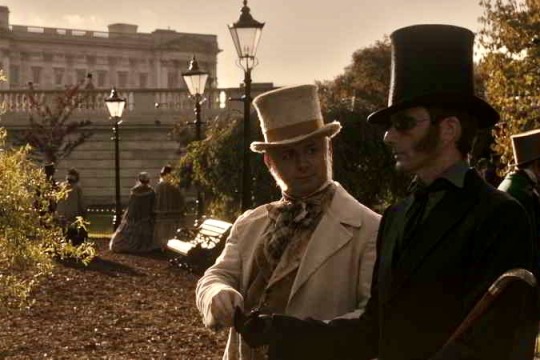
The meeting at St. James Park in 1862 was a defining moment for Aziraphale. Crowley had been literally sucked into a Hellhole, screaming, for saving Elspeth in 1827 Edinburgh. At the park in 1862, he's visibly stiff, barely even turning his head, carrying a cane, and incredibly subdued in all ways. There's no energized pacing, no hand gestures or leaning in. He hardly moves. His corporation was included in Hell's punishment, and he looks broken.
Aziraphale couldn't possibly NOT see this. We know he was worried when Crowley was taken. We see this in present-day when he slightly bullies and borrows a phone immediately after remembering the events of 1827, just so he can check on Crowley! Back in 1862, he sees Crowley's despair and brokenness. Again, he handles it indirectly, and hurtfully. If he can't keep Crowley safe, he'll push him away, for his own good. Like an old tear-jerker classic movie where the little boy tearfully chases away his beloved dog so that the mean villain won't shoot it...
Aziraphale is an intensely emotional being who often seems overwhelmed by his own feelings, leading him to handle difficult situations badly sometimes. However, he's also incredibly loving. The former Guardian of the Eastern Gate is a protector by nature and by choice. He loves humanity, and risks his ethereal status repeatedly to protect them. He loves Crowley, his best friend, whether he feels safe to admit it aloud or not. He'll risk anything, including the friendship itself, to protect him.
For 1800 years, Heaven didn't have an embassy in London. If Aziraphale just wanted a physical building to store his treasured collection of books, he could have done that. Heaven is a corporate hierarchy with paperwork and red tape. There surely were requests and filings and complications in trying to get an official Embassy authorized! Possibly he could simply have obtained permission to own a simple shop as a "cover" to fit in with the humans (like eating sushi!).
Instead, the bookshop is a Heavenly Embassy with miraculous protections. No one can enter unless first invited, not even angels. Only Crowley can freely come and go, at least until the chain of events at the end of Season 2. Prior to that, the bookshop is a safe place for them. Crowley is visibly more relaxed there. He and Aziraphale get along there, laugh and tease, and have their closest moments together. They are safe there, and Crowley can't be harmed within its walls.
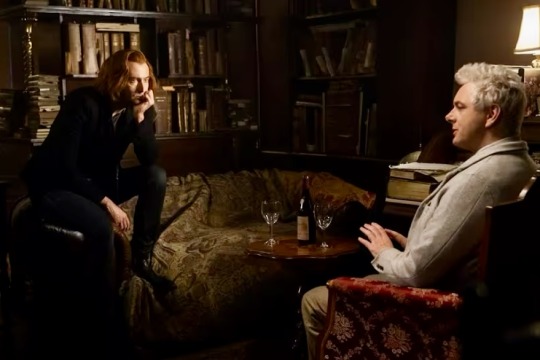
This was Aziraphale's goal. He had too often felt the helplessness of witnessing how his relationship with Crowley put the demon at constant risk, even before 1827. From the time their friendship truly began at Job's home in Uz until Crowley was kidnapped by Hell in 1827, we never see Aziraphale try to discourage or end the relationship. Every interaction except Essex (537 A.D.) brought them closer together, and even Essex was quite collegial until Crowley first proposed "The Arrangement." Aziraphale hoped that creating the bookshop, with its protections, would help keep Crowley safe, or at least give him a temporary haven where he could relax and breathe more freely.
Imagine how powerless Aziraphale must have felt when 1827 slammed home the realization that he could never do enough to fully protect Crowley from Hell, or from Heaven for that matter. Yet, despite the danger, Crowley always seeks him out again, at continued risk. "Ducks have ears." Someone may always be listening. No wonder the angel unilaterally tried to end the friendship. Not a fair or emotionally healthy strategy, admittedly. But Not too difficult to understand.
-----
Final note, my own fun little imagining about the shop name: A. Z. FELL & Co. I know that adding "and Company" was a common business technique to make one's appear large and prosperous. It wouldn't be unusual at the time for a single shop owner to use, particularly for a property as impressive as Aziraphale's. But it's my personal belief, be it fact or headcanon, that the angel was entirely thinking of his best friend when he added "and Company" to the shop name. Crowley has an open invitation, Crowley is his guest, his companion. Crowley is welcome company. A & C. A.Z. Fell & Co.
#good omens#ineffable husbands#good omens 2#aziracrow#aziraphale good omens#wistfulnightingale#good omens meta#aziraphale loves crowley#crowley is reckless#guardian of the eastern gate
131 notes
·
View notes
Text
When you want to plan an exciting rescue/date, you have to go all out, including dressing as a sumptuous profiterole begging to be eaten

Why Aziraphale is completely ridiculous in the Bastille scene (and I love him so much for it)
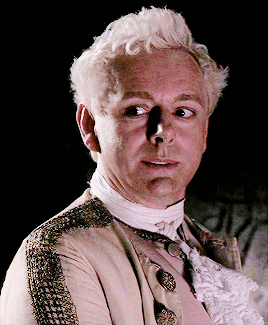
A while ago I posted a comparison of Aziraphale and Crowley's costumes in the 1793 flashback in Good Omens and I wanted to add these little tidbits. (Because they haunt me.)
I feel like most people know this but IF YOU DON'T, Paris in 1793 is right in the middle of something called La Terreur.
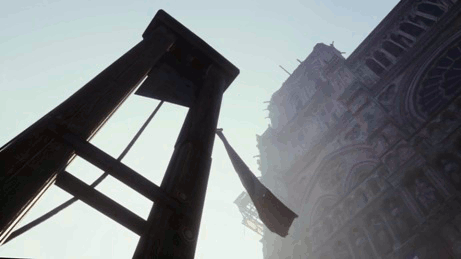
HISTORY LESSON If you didn't learn this in school the French Revolution was when, after years of escalating social tension, a coalition representing the working classes of France revolted against the monarchy, violently overthrew King Louis XVI, and declared France to be a republic.
The new National Convention governing France ruled that King Louis XVI and his wife Marie Antoinette were traitors to the people of France because of how they had spent ridiculous amounts of money on luxuries for themselves while vast numbers of the lower classes were literally starving to death. (keep the bold in mind - wealth and class disparities were one of the key causes of the whole-ass revolution)
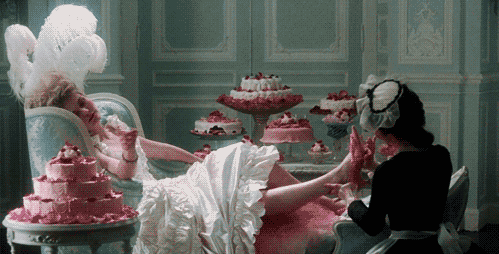
In 1793 (year of the flashback) both the King and Queen were executed by guillotine for their crimes.
This kicks of something called The Reign of Terror (La Terreur if you want to be French about it). A multi-year-long period in which the National Convention goes on a bloody witch hunt for any and every member of the middle or upper classes who could even possibly be considered a traitor by those same standards.
If you A) had money or privilege, and B) had ever used your money or privilege to treat yourself, you were getting executed. Over 25,000 people died during the Reign of Terror, half of them by guillotine. In fact, the iconic guillotine was used because it was physically impossible to keep up with the sheer number of people they were executing in Paris every single day.
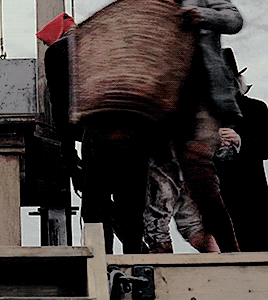
Some things that could get you killed (actually and completely seriously) during the Reign of Terror:
Implying in any way you were sympathetic to the monarchy
Having a noble title
Having expensive things
Wearing expensive, luxurious clothes (*cough* AZIRAPHALE)
helping or sympathizing with anyone who did any of the above
a working-class person saying you were mean to them once
And then there's this bitch...
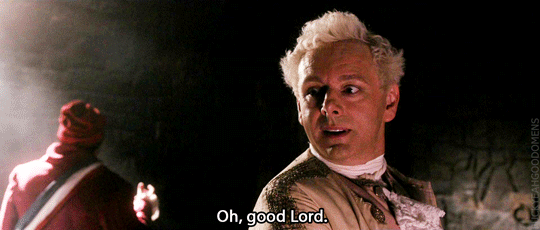
I AM NOBILITY PLEASE KILL ME So we have established that Paris in 1793 is in the middle of a frenzied, state-sanctioned bloodbath in which the working classes are massacring everyone even remotely nobility-adjacent. And in the middle of this frenzy, Aziraphale proceeds to roll up in Paris in this outfit:
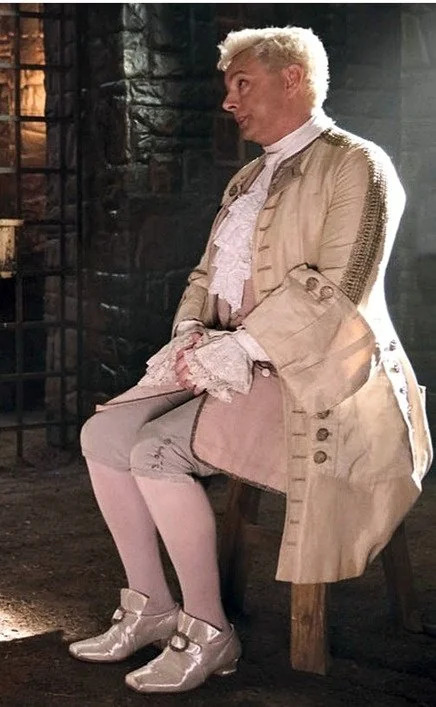
How will this outfit get him killed? Let me count the ways...
First off- at this point everyone with even the tiniest shred of self- preservation is hiding the fact that they are in any way associated with the monarchy. The wealthy are straight-up abandoning mansions. The middle-class are plastering over decorations to make their house look 'poor'. The only people dressed remotely decent are the guys leading the National Convention and that's just because nobody can stop them. Everyone else is in 24/7 peasant cosplay or else they are covering themselves in cockades and sashes on to show they're pro-Republic.
Aziraphale is basically a giant shiny white sign saying I AM NOBILITY PLEASE KILL ME.
First off the lace jabot and lace cuffs are both associated with the old-school wealthy in the 1790's.
His coat is also decorated in gold braid and silver buttons, which are both marks of wealth and luxury.
He basically looks like he works for Louis XIV - not just rich, but old school rich.
We know it's his natural hair color, but hair powdering (with clay and starch) had been a big trend with the rich all throughout the 18th century to get that clean white venerable look . To someone who doesn't know it's natural, it would very much look like he's wearing hair powder.
He's wearing shades of cream and white, which are very hard to keep clean and clearly states that the wearer is rich and can afford the upkeep necessary to keep an outfit like that stain-free.
He's wearing white knee-breeches and stockings, also called culottes. See above about laundry and how rich you had to be to wear white, but also working-class men wore long pants like this:
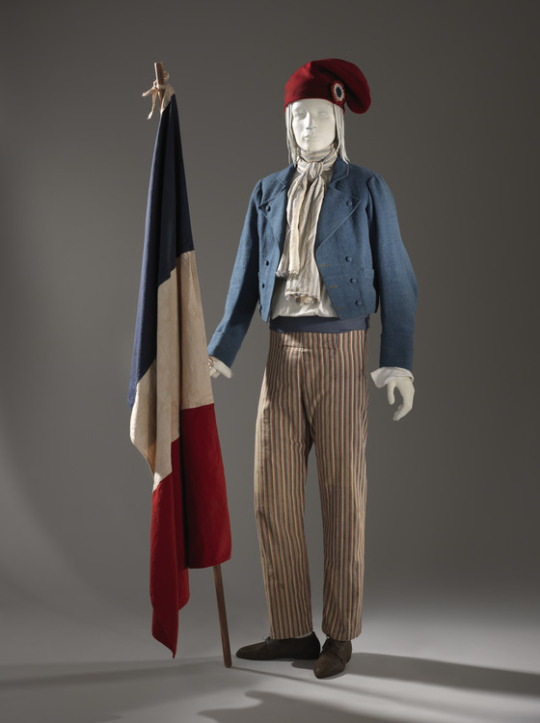
A large faction involved in the Revolution were the Sans-Culottes (no-culottes aka we wear long pants LIKE GOOD OLD WORKING MEN). Culottes are specifically associated with everything the revolution hated. That's right - Aziraphale is literally wearing The Fanciest of Fancy Pants in a city where a group called The Men Against Fancy Pants are running around murdering people.
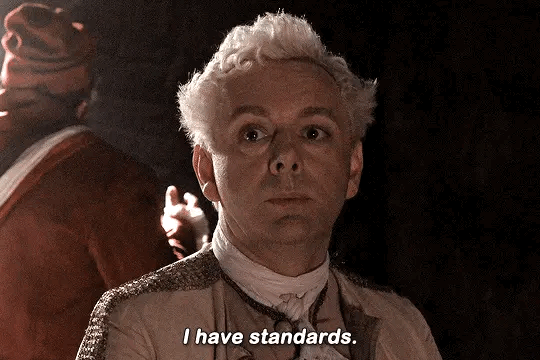
And then there are his shoes.
Oh god his shoes
I could do a whole post about Aziraphale's blessed little white satin pumps and how ridiculous they are.
Actually I might just do that because this is getting so long and I still have to talk about the brioche.
So I can't remember if it's in the script book or if it's from Neil Gaiman's tumblr, but it's apparently canon (?) that Aziraphale was going around in that outfit asking people where he could get crepes and brioche when he was arrested.
The Affair of the Brioches
So... uh... we've all heard the line attributed to Marie Antoinette- how when she was told that her people were starving because there was no bread left in Paris, she famously said...

It's morphed into 'let them eat cake', but the line is first recorded as, "Then let them eat brioches."
While it's unlikely she ever actually said it, the important thing is that... people in 1793 would have thought she said it. It was used as political smear to show how arrogant and out of touch the monarchy was. Marie Antoinette in particular was reviled by the people of France, who thought she was the main cause of their economic problems. That's why she was executed too.
Bread and brioche and the lines between poverty and privilege were a big thing in Revolutionary France. There was a lot of political connotation to what you ate. The French Revolution came about because of decades of suffering among the lower classes of France. It wasn't something that some dudes just decided to do. The people of Paris have been through years of the absolute worst, most oppressive poverty and starvation you can imagine, all while watching the rich throw money around crazy.
So let us recap.
Aziraphale is dressed so ridiculously posh that he looks like a joke parody of a nobleman... and he is bumbling around Paris during the Reign of Terror. Asking people. For brioche. How I imagine everyone looked at him:

It is so astoundingly tone deaf and tactless. He is basically cosplaying as Marie Antoinette and then going around asking the poor for cake.
I just.... Aziraphale. babygirl. no. oh no. You're lucky they even bothered to take you to prison. I am amazed Crowley ever let him live that down.
I have no conclusion other than this. Aziraphale is ridiculous and I love him so much.
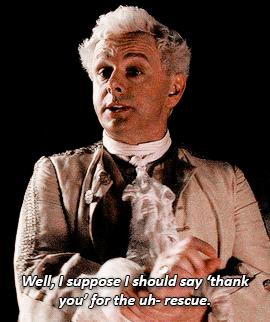
YES YOU REALLY SHOULD SIR.
#he is ridiculous#and amazing#and absurd#and i love him#good omens#aziraphale#good omens meta#good omens costumes#aziraphale's white satin pumps#ineffable husbands#good omens 1793#aziraphale 1793#bastille aziraphale
2K notes
·
View notes
Text


Sadly, there's not enough room in the poll for the iconic Heaven disguise, but it's always worth sharing

#good omens#good omens 2#crowley#anthony j crowley#crowley through the ages#crowley's sunglasses#bildad the shuhite#roman crowley#victorian crowley#1601 crowley#1793 crowley#1941 crowley#1862 crowley#1827 crowley#1967 crowley#1970s crowley#nanny ashtoreth#david tennant
235 notes
·
View notes
Note
Hello^^
I was wondering if there were any fics where Aziraphale purposely gets himself into trouble so Crowley would rescue him?
Thank you!
Hi. Here are some fics where Aziraphale gets himself in trouble so Crowley will rescue him...
A Thoroughly Unreliable Narration by Devilbaby (G)
Aziraphale has a danger kink and keeps getting himself into dangerous situations on purpose because he knows Crowley will show up and rescue him every time.
In Distress by KaytheJay (G)
Aziraphale has gotten herself in quite the pickle and needs rescuing. However, the first knight who comes to save her is not the one that she wanted to see.
Chain Me to the Wall by HipHopAnonymous (E)
What kind of an angel gets himself locked up in the Bastille during a revolution? A very naughty one. Crowley can hardly believe Aziraphale would be so brazen and so stupid. And all for some naive attempt at flirtation. The demon will just have to take the angel in hand to teach him a very thorough lesson about tempting danger. But perhaps the angel isn't quite so naive after all.
We'll always have Paris by Kitty_Kat_Undercover (E)
Crowley knew right away the Angel was in trouble. Of course, he had no idea he'd put himself there on purpose. ___________ Post Bastille rescue and luxuriant Crepe lunch, Crowley and Aziraphale both discover another appetite. Who would have thought it was the Angel leading the Demon back to his place? Not the love-struck Demon. ♡
"Barely counts as a miracle" by Becci Barnes (E)
1793, Paris. When Aziraphale set off for France he had a detailed plan in mind. Getting himself captured was only phase one, leading up to the much more enticing and long-awaited phase two. Unfortunately, he struggles to clue Crowley in on this plan. After living through many awkward attempts and a demeaning dance, Aziraphale has to resort to more desperate measures. Or: Aziraphale plays the Damsel in Distress and eventually gets Crowley to punish him properly.
- Mod D
#good omens#ineffable husbands#ineffable partners#aziraphale is just enough of a bastard#crowley to the rescue#adult omens#the bastille#mod d
83 notes
·
View notes
Text
Les Mis French History Timeline: all the context you need to know to understand Les Mis
Here is a simple timeline of French history as it relates to events in Les Miserables, and to the context of Les Mis's publication! A post like this would’ve really helped me four years ago, when I knew very little about 1830s France or the goals of Les Amis, so I’m making it now that I have the information to share! ^_^
This post will be split into 4 sections: a quick overview of important terms, the history before the novel that’s important to the character's backstories, the history during the novel, and then the history relevant to the 1848-onward circumstances of Hugo’s life and the novel’s publication.
Part 1: Overview
The novel takes place in the aftermath of the Battle of Waterloo, during a period called the Restoration.
The ancient monarchy was overthrown during the French Revolution. After a series of political struggles the revolutionary government was eventually replaced by an empire under Napoleon. Then Napoleon was defeated and sent into exile— but then he briefly came back and seized power for one hundred days—! and then he was defeated yet again for good at the battle of Waterloo in 1815.
After all that political turmoil, kings have been "restored" to the throne of France. The novel begins right as this Restoration begins.
The major political parties important to generally understanding Les Mis (Wildly Oversimplified) are Republicans, Liberals, Bonapartists, and Royalists. It’s worth noting that all these ‘party terms’ changed in meaning/goals over time depending on which type of government was in power. In general though, and just for the sake of reading Les Mis:
Republicans want a Republic, where people have power rather than monarchs and (in this context) elect their leaders democratically— they’re the very left wing progressive ones, and are heavily outcast/censored/policed. Les Amis are Republicans.
Liberals: we don’t have time to go into it, but I don’t think there are any characters in Les Mis defined by their liberalism.
Bonapartists are followers of Napoleon Bonaparte I, who led the Empire. Many viewed the Emperor as more favorable or progressive to them than a king would be. Georges Pontmercy is a Bonapartist, as is Pere Fauchelevent.
Royalists believe in the divine right of Kings; they’re conservative. Someone who is extremely royalist to the point of wanting basically no limits on the king’s power at all are called “Ultraroyalists” or “ultra.” Marius’s conservative grandfather Gillenromand is an ultra royalist. Hugo is also very concerned with criticizing the "Great Man of History," the view that history is pushed forward by the actions of a handful of special great men like kings and emperors. Les Mis aims to focus on the common masses of people who push history forward instead.
Part 2: Timeline of History involved in characters’ Backstories
1789– the March on the bastille/ the beginning of the original French Revolution. A young Myriel, who is then a shallow married aristocrat, flees the country. His family is badly hurt by the Revolution. His wife dies in exile.
1793– Louis XVI is found guilty of committing treason and sentenced to death. The Conventionist G—, the old revolutionary who Myriel talks to, votes against the death of the king.
1795: the Directory rules France. Throughout much of the revolution, including this period, the country is undergoing “dechristianization” policies. Fantine is born at this time. Because the church is not in power as a result of dechristianization, Fantine is unbaptized and has no record of a legal given name, instead going by the nickname Fantine (“enfantine,” childlike.)
1795: The Revolutionary government becomes more conservative. Jean Valjean is arrested.
1804: Napoleon officially crowns himself Emperor of France. the Revolution’s dream of a Republic is dead for a bit. At this time, Myriel returns from his exile and settles down in the provinces of France to work as a humble priest. Then he visits Paris and makes a snarky comment to Napoleon, and Napoleon finds him so witty that he appoints him Bishop.
Part 3: the novel actually begins
1815: Napoleon is defeated at the Battle of Waterloo by the allied nations of Britain and Prussia. Read Hugo’s take on that in the Waterloo Digression! He gets a lot of facts wrong, but that’s Hugo for you.
Marius’s father, Baron Pontmercy, nearly dies on the battlefield. Thenardier steals his belongings.
After Napoleon is defeated, a king is restored to the throne— Louis XVIII, of the House of Bourbon, the ancient royal house that ruled France before the Revolution. In order to ensure that Louis XVIII stays on the throne, the nations of Britian, Prussia, and Russia, send soldiers occupy France. So France is, during the early events of the novel, being occupied by foreign soldiers. This is part of why there are so many references to soldiers on the streets and garrisons and barracks throughout the early portions of the novel. The occupation officially ended in 1818.
1815 (a few months after Waterloo): Jean Valjean is released from prison and walks down the road to Digne, the very same road Napoleon charged down during his last attempt to seize power. Many of the inns he passes by are run by people advertising their connections to Napoleon. Symbolically Valjean is the poor man returning from exile into France, just as Napoleon was the Great Man briefly returning from exile during the 100 days, or King Louis XVIII is the Great King returning from exile to a restored throne.
1817: The Year 1817, which Hugo has a whole chapter-digression about. Louis XVIII of the House of Bourbon is on the throne. Fantine, “the nameless child of the Directory,” is abandoned by Tholomyes.
1821: Napoleon dies in exile.
1825: King Louis XVIII dies. Charles X takes the throne. While Louis XVIII was willing to compromise, Charles X is a far more conservative ultra-royalist. He attempts to bring back something like the Pre-Revolution style of monarchy.
Underground resistance groups, including Republican groups like Les Amis, plot against him.
1827-1828: Georges Pontmercy, bonapartist veteran of Waterloo, dies. Marius, who has been growing up with his abusive Ultra-royalist grandfather and mindlessly repeating his ultra-royalist politics, learns how much his father loved him. He becomes a democratic Bonapartist.
Marius is a little bit late to everything though. He shouts “long live the Emperor!” Even though Napoleon died in 1821 and insults his grandfather by telling him “down with that hog Louis XVIII” even though Louis XVIII has been dead since 1825. He’s a little confused but he’s got the spirit.
Marius leaves his grandfather to live on his own.
1830: “The July Revolution,” also known as the “Three Glorious Days” or “the Second French Revolution.” Rebels built barricades and successfully forced Charles X out of power.
Unfortunately, TL;DR moderate politicians prevented the creation of a Republic and instead installed another more politically progressive king — Louis-Philippe, of the house of Orleans.
Louis-Philippe was a relative of the royal family, had lived in poverty for a time, and described himself as “the citizen-king.” Hugo’s take on him is that he was a good man, but being a king is inherently evil; monarchy is a bad system even if a “good” dictator is on the throne.
The shadow of 1830 is important to Les Mis, and there’s even a whole digression about it in “A Few Pages of History,” a digression most people adapting the novel have clearly skipped. Les Amis would’ve probably been involved in it....though interestingly, only Gavroche and maybe Enjolras are explicitly confirmed to have been there, Gavroche telling Enjolras he participated “when we had that dispute with Charles X.”
Sadly we're following Marius (not Les Amis) in 1830. Hugo mentions that Marius is always too busy thinking to actually participate in political movements. He notes that Marius was pleased by 1830 because he thinks it is a sign of progress, but that he was too dreamy to be involved in it.
1831: in “A Few Pages of History” Hugo describes the various ways Republican groups were plotting what what would later become the June Rebellion– the way resistance groups had underground meetings, spread propaganda with pamphlets, smuggled in gunpowder, etc.
Spring of 1832: there is a massive pandemic of cholera in Paris that exacerbates existing tensions. Marius is described as too distracted by love to notice all the people dying of cholera.
June 1st, 1832: General Lamarque, a member of parliament often critical of the monarchy, dies of cholera.
June 5th and 6th, 1832: the June Rebellion of 1832:
Republicans, students, and workers attempt to overthrow the monarchy, and finally get a democratic Republic For Real This Time. The rebellion is violently crushed by the National Guard.
Enjolras was partially inspired by Charles Jeanne, who led the barricades at Saint-Merry.
Part 4: the context of Les Mis’s publication
February 1848: a successful revolution finally overthrows King Louis Philippe. A younger Victor Hugo, who was appointed a peer of France by Louis-Philippe, is then elected as a representative of Paris in the provisional revolutionary government.
June 1848: This is a lot, and it’s a thing even Hugo’s biographers often gloss over, because it’s a horrific moral failure/complexity of Hugo’s that is completely at odds with the sort of politics he later became known for. The short summary is that in June 1848 there was a working-class rebellion against new labor laws/forced conscription, and Victor Hugo was on the “wrong side of the barricades” working with the government to violently suppress the rebels. To quote from this source:
Much to the disappointment of his supporters, in [Victor Hugo’s] first speech in the national assembly he went after the ateliers or national workshops, which had been a major demand of the workers. Two days later the workshops were closed, workers under twenty-five were conscripted and the rest sent to the countryside. It was a “political purge” and a declaration of war on the Parisian working class that set into motion the June Days, or the second revolution of 1848—an uprising lauded by Marx as one of the first workers’ revolutions. As the barricades went up in Paris, Hugo was tragically on the wrong side. On June 24 the national assembly declared a state of siege with Hugo’s support. Hugo would then sink to a new political low. He was chosen as one of sixty representatives “to go and inform the insurgents that a state of siege existed and that Cavaignac [the officer who had led the suppression of the June revolt] was in control.” With an express mission “to stop the spilling of blood,” Hugo took up arms against the workers of Paris. Thus, Hugo, voice of the voiceless and hero of workers, helped to violently suppress a rebellion led by people whom he in many ways supported—and many of whom supported him. With twisted logic and an even more twisted conscience, Hugo fought and risked his life to crush the June insurrection.
There is an otherwise baffling chapter in Les Mis titled "The Charybdis of the Faubourg Saint Antoine and the Scylla of the Fauborg Du Temple," where Hugo goes on a digression about June of 1848. Hugo contrasts June of 1848 with other rebellions, and insists that the June 1848 Rebellion was Wrong and Different. It is a strangely anti-rebellion classist chapter that feels discordant with the rest of the book. This is because it is Hugo's effort to (indirectly) address criticisms people had of his own involvement in June 1848, and to justify why he believed crushing that rebellion with so much force was necessary. The chapter is often misused to say that Hugo was "anti-violent-rebellion all the time" (which he wasn't) or that "rebellion is bad” is the message of Les Mis (which it isn't) ........but in reality the chapter is about Hugo attempting to justify his own past actions to the reader and to himself, actions which many people on his side of the political spectrum considered a betrayal. He couldn't really have written a novel about the politics of barricades without addressing his actions in June 1848, and he addressed them by attempting to justify them, and he attempted to justify them with a lot of deeply questionable rhetoric. 1848 is a lot, and I don't fully understand all the context yet-- but that general context is necessary to understand why the chapter is even in the novel. Late 1848/1849: Quoting from the earlier source again:
In the wake of the revolution, Hugo tried to make sense of the events of 1848. He tried to straddle the growing polarization between, on the one hand, “the party of order,” which coalesced around Napoleon’s nephew Louis-Napoleon Bonaparte, who in December 1848 had been elected France’s president under a new constitution, and the “party of movement” (or radical Left) that, in the aftermath of 1848, had made considerable advances. In this climate, as Hugo increasingly spoke out, and faced opposition and repression himself, he was radicalized and turned to the Left for support against the tyranny and “barbarism” he saw in the government of Louis Napoleon. The “point of no return” came in 1849. Hugo became one of the loudest and most prominent voices of opposition to Louis Napoleon. In his final and most famous insult to Napoleon, he asked: “Just because we had Napoleon le Grand [Napoleon the Great], do we have to have Napoleon le petit [Napoleon the small]?” Immune from punishment because of his role in the government, Bonaparte retaliated by shutting down Hugo’s newspaper and arresting both his sons.
Thenardier is possibly meant to be Hugo’s caricature of Louis-Napoleon/Napoleon III. He is “Napoleon the small,” an opportunistic scumbag leeching off the legacy of Waterloo and Napoleon to give himself some respectability. He is a metaphorical ‘graverobber of Waterloo’ who has all of Napoleon’s dictatorial pettiness without any of his redeeming qualities.
It’s also worth noting that Marius is Victor “Marie” Hugo’s self-insert. Hugo’s politics changed wildly over time. Like Marius he was a royalist when was young. And like Marius, he looked up to Napoleon and to Napoleon III, before his views of them were shattered. This is reflected in the way Marius has complicated feelings of loyalty to his father (who’s very connected to the original Napoleon I) and to Thenardier (who’s arguably an analogue for Napoleon IiI.)
1851:
On December 2, 1851, Louis Napoleon launched his coup, suspending the republic’s constitution he had sworn to uphold. The National Assembly was occupied by troops. Hugo responded by trying to rally people to the barricades to defend Paris against Napoleon’s seizure of power. Protesters were met with brutal repression. Under increasing threat to his own life, with both of his sons in jail and his death falsely announced, Hugo finally left Paris. He ultimately ended up on the island of Guernsey where he spent much of the next eighteen years and where he would write the bulk of Les Misérables. It was from here that his most radical and political work was smuggled into France.
Hugo arguably did some of his most important political work after being exiled. In Guernsey, he aided with resistance against the regime of Napoleon III. Hugo’s popularity with the masses also meant that his exile was massive news, and a thing all readers of Les Miserables would’ve been deeply familiar with.
This is why there are so many bits of Les Mis where the narrator nostalgically reflects on how much they wish they were in Paris again —these parts are very political; readers would’ve picked up that this was Victor Hugo reflecting on he cruelty of his own exile.
1862-1863: Les Mis is published. It is a barely-veiled call to action against the government of Napoleon III, written about the June Rebellion instead of the current regime partially in order to dodge the censorship laws at the time.
Conservatives despise the book and call it the death of civilization and a dangerous rebellious evil godless text that encourages them to feel bad for the stupid evil criminal rebel poors and etc etc etc– (see @psalm22-6 ‘s excellent translations of the ancient conservative reviews)-- but the novel sells very well. Expressing approval or disapproval of the book is considered inherently political, but fortunately it remains unbanned.
…And that’s it! An ocean of basic historical context about Les Mis!
If anyone has any corrections or additions they would like to make, feel free to add them! I have researched to the best of my ability, but I don’t pretend to be perfect. I also recommend listening to the Siecle podcast, which covers the events of the Bourbon Restoration starting at the Battle of Waterloo, if you're interested in learning more about the period!
#les mis#someone in a discord server asked about this a while back#so i put it together!#it’s basically what I told them in the discord server but as a tumblr post#and with some extra stuff I forgot to say#but yeAH maybe if more historical information gets spread#we’ll get more canon era fanfics >:3333#which are always fun
516 notes
·
View notes
Photo

Drownings at Nantes
The Drownings at Nantes were a series of mass killings that took place in Nantes, France from November 1793 to February 1794 during the Reign of Terror. Overseen by Jean-Baptiste Carrier, the representative-on-mission from Paris, thousands of “counter-revolutionary” prisoners were taken out on barges to the middle of the Loire River where they were sunk.
These mass drownings, or noyades, were at first conducted in secret under the cover of darkness. Consequently, there is little information about how often they occurred, as well as the precise number of victims, a number which could range anywhere between 1,800 and 4,800 with some sources putting the number as high as 10,000. Victims were inhabitants of Nantes’ prisons and were therefore rebels captured during the War in the Vendée, refractory Catholic priests and nuns, and other “suspects” imprisoned under the laws imposed by the Terror. The scale and brutality of this massacre has earned it notoriety as one of the most horrific acts of civilian slaughter to occur during the French Revolution (1789-1799).
Prelude: Nantes & the Vendée
During the time of the Revolution, Nantes was one of the wealthiest cities in France. Situated on the Loire River, about 31 miles from the Atlantic coast, it was a major hub for trade and trans-Atlantic travel. With a population of 90,000, Nantes was second only to Bordeaux in importance on France’s west coast. It was home to wealthy bourgeoisie, merchants, and master craftsmen, and it attracted many countryside peasants looking for work. When the Revolution began in 1789, it was generally welcomed by the Nantais citizens, who showed their support by emulating the Storming of the Bastille and seizing their own local chateau, the Castle of the Dukes of Brittany.
Meanwhile, the rural lands in the region of the Vendée, just south of Nantes, were on average more politically and religiously conservative than the rest of France and bristled under the anti-Catholic reforms imposed by the revolutionaries. Most egregious was the Civil Constitution of the Clergy, which outlawed all religious orders and subjected the French Catholic Church to the authority of the state. Clergymen who refused to swear oaths of loyalty to the new constitution were labelled refractory priests and were barred from preaching; by late 1791, such clerics were considered to be counter-revolutionary conspirators and calls went up for their arrests or deportations.
The pious residents of the Vendée saw this as an attack against their way of life and were therefore alienated from the Revolution. When, in February 1793, the National Convention called for 300,000 soldiers to fight in the War of the First Coalition (1792-97), to be raised by conscription if necessary, the Vendeans decided they had had enough. Thousands of peasant uprisings blossomed into a full-fledged rebellion, combining their strength into a unified force that became known as the Catholic and Royal Army. Although the War in the Vendée had not begun with royalist intentions, the rebels made their disdain for the Republic known by acknowledging the claim of Louis XVII of France, the uncrowned boy king still being held captive in Paris.
Under the command of the imposing generalissimo Jacques Cathelineau, the rebels enjoyed initial success. The spring of 1793 saw the entire Vendée region fall to rebel control, and every Republican force sent against them was defeated. Despite his reluctance to give up the home advantage, Cathelineau realized the war must be taken to enemy soil. Rather than striking a blow at Paris itself, Cathelineau instead marched his army to Nantes, which was besieged at the end of June. The wealthy port city would make an excellent prize; not only would it make for a strong provisional capital for the insurrection, but the Vendeans planned to invite a British invasion force into the harbor. With British support, the rebels would have the strength to threaten Paris.
The rebels demanded the immediate surrender of Nantes, lest the garrison be put to the sword. But they had been made over-confident by months of easy victories, and failed to realize that the 10,000-man city garrison was better disciplined and more experienced than any Republican force they had yet encountered. When the garrison refused to surrender, the rebels launched a sloppy, uncoordinated attack on 29 June that ended in disaster when Cathelineau was mortally wounded by a sharpshooter. The massive failure of the Battle of Nantes would mark the beginning of the end of the Catholic and Royal Army, which limped back into the Vendée where it was ruthlessly ground into the dirt by well-equipped and well-trained Republican troops.
As the Republic ravaged the Vendée as punishment for its treason, thousands of Vendean peasants fled the warzone, looking for sanctuary. Many of them arrived outside Nantes, hoping that as non-combatants they would be given refuge. Instead, they were clapped in irons and thrown into the prisons alongside their fathers and brothers who had been captured after the battle and had since been languishing as prisoners-of-war. On 17 September 1793, the quasi-dictatorial Committee of Public Safety enacted the Law of Suspects, which demanded the arrests of all counter-revolutionary “suspects” across France, a term so vague it could be bent to apply to just about anyone. In Nantes and the surrounding lands, those who had aided the Vendean rebels were arrested, as were refractory priests and nuns, and those who were suspected of harboring royalist or Catholic sympathies. By November, the prisons of Nantes were bursting at the seams, with roughly 10,000 people clumped together in small, sordid cells. This was a staggering number, equivalent to more than a tenth of the city’s general population.
Naturally, this put a strain on the city’s resources. Nantes had been made into an immense military hospital, and now had to provide for thousands of wounded Republican troops, all the counter-revolutionary prisoners, and its own population. With winter on the way, the municipal government wrote to the Committee of Public Safety in Paris for help. In answer, the Committee sent a representative-on-mission, Jean-Baptiste Carrier, to Nantes. With him went death.
Continue reading...
25 notes
·
View notes